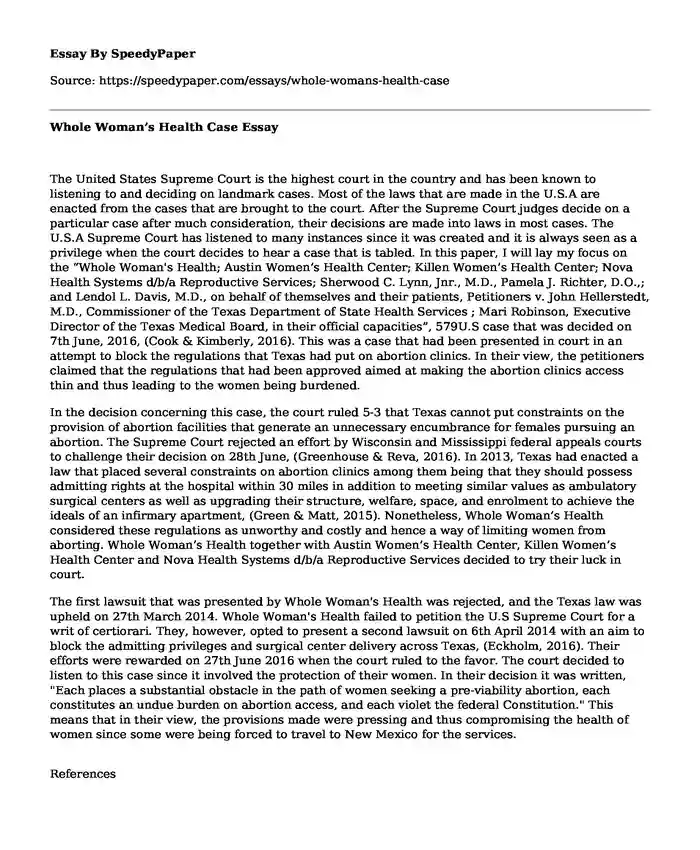
| Type of paper: | Essay |
| Categories: | Finance Law Medicine Technology Society |
| Pages: | 3 |
| Wordcount: | 682 words |
The United States Supreme Court is the highest court in the country and has been known to listening to and deciding on landmark cases. Most of the laws that are made in the U.S.A are enacted from the cases that are brought to the court. After the Supreme Court judges decide on a particular case after much consideration, their decisions are made into laws in most cases. The U.S.A Supreme Court has listened to many instances since it was created and it is always seen as a privilege when the court decides to hear a case that is tabled. In this paper, I will lay my focus on the "Whole Woman's Health; Austin Women's Health Center; Killen Women's Health Center; Nova Health Systems d/b/a Reproductive Services; Sherwood C. Lynn, Jnr., M.D., Pamela J. Richter, D.O.,; and Lendol L. Davis, M.D., on behalf of themselves and their patients, Petitioners v. John Hellerstedt, M.D., Commissioner of the Texas Department of State Health Services ; Mari Robinson, Executive Director of the Texas Medical Board, in their official capacities", 579U.S case that was decided on 7th June, 2016, (Cook & Kimberly, 2016). This was a case that had been presented in court in an attempt to block the regulations that Texas had put on abortion clinics. In their view, the petitioners claimed that the regulations that had been approved aimed at making the abortion clinics access thin and thus leading to the women being burdened.
In the decision concerning this case, the court ruled 5-3 that Texas cannot put constraints on the provision of abortion facilities that generate an unnecessary encumbrance for females pursuing an abortion. The Supreme Court rejected an effort by Wisconsin and Mississippi federal appeals courts to challenge their decision on 28th June, (Greenhouse & Reva, 2016). In 2013, Texas had enacted a law that placed several constraints on abortion clinics among them being that they should possess admitting rights at the hospital within 30 miles in addition to meeting similar values as ambulatory surgical centers as well as upgrading their structure, welfare, space, and enrolment to achieve the ideals of an infirmary apartment, (Green & Matt, 2015). Nonetheless, Whole Woman's Health considered these regulations as unworthy and costly and hence a way of limiting women from aborting. Whole Woman's Health together with Austin Women's Health Center, Killen Women's Health Center and Nova Health Systems d/b/a Reproductive Services decided to try their luck in court.
The first lawsuit that was presented by Whole Woman's Health was rejected, and the Texas law was upheld on 27th March 2014. Whole Woman's Health failed to petition the U.S Supreme Court for a writ of certiorari. They, however, opted to present a second lawsuit on 6th April 2014 with an aim to block the admitting privileges and surgical center delivery across Texas, (Eckholm, 2016). Their efforts were rewarded on 27th June 2016 when the court ruled to the favor. The court decided to listen to this case since it involved the protection of their women. In their decision it was written, "Each places a substantial obstacle in the path of women seeking a pre-viability abortion, each constitutes an undue burden on abortion access, and each violet the federal Constitution." This means that in their view, the provisions made were pressing and thus compromising the health of women since some were being forced to travel to New Mexico for the services.
References
Cook Lindsey & Kimberly Leonard. Jan. 11, 2016. Explaining the Whole Woman's Health v. Hellerstedt Abortion Case. U.S News. Retrieved from https://www.usnews.com/news/blogs/data-mine/2016/01/11/supreme-court-and-abortion-why-whole-womans-health-v-hellerstedt-matters
Eckholm Erik. Feb. 29, 2016. Young Lawyers Ready to Argue a Major Abortion Case Before the Supreme Court. The New York Times. Retrieved from https://nytimes.com/2016/03/01/us/young-lawyers-ready-to-argue-a-major-abortion-case-before-the-supreme-court.html?smid=pl-share
Green Emma & Matt Ford. Nov. 13, 2015. A New Supreme Court Challenge: The Erosion of Abortion Access in Texas. Atlantic. Retrieved from https://www.theatlantic.com/politics/archive/2015/11/a-new-supreme-court-challenge-the-erossion-of-abortion-access-in-texas/415929/
Greenhouse Linda & Reva B. Siegel. Mar. 2016. Casey and the Clinic Closing: When "Protecting Health" Obstructs Choice. The Yale Law Journal. Vol 125, No. 5. Retrieved from https://yalelawjournal.org/article/casey-and-the-clinic-closings
Cite this page
Whole Woman's Health Case. (2022, Dec 06). Retrieved from https://speedypaper.net/essays/whole-womans-health-case
Request Removal
If you are the original author of this essay and no longer wish to have it published on the SpeedyPaper website, please click below to request its removal:
- Free Essay Example on Truth in Art
- Free Essay Describing the Gait Examination of TKA patients
- Free Essay: Chesapeake IT Consultants, The Introduction of the IT System, And Hiring New Consultants
- Technology Essay Example: Wireless Networks
- Paper Example on Reporting Evaluation Results and Ethics
- Essay Sample on Benefits and Drawbacks of Absolute Performance Standards
- Essay Sample on Westward Expansion and Manifest Destiny
Popular categories




